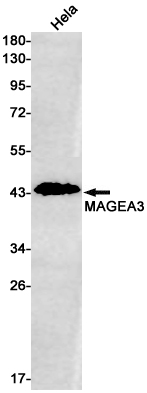
| WB | 1/500-1/1000 | Human,Mouse,Rat |
| IF | 咨询技术 | Human,Mouse,Rat |
| IHC | 咨询技术 | Human,Mouse,Rat |
| ICC | 技术咨询 | Human,Mouse,Rat |
| FCM | 咨询技术 | Human,Mouse,Rat |
| Elisa | 咨询技术 | Human,Mouse,Rat |
| Aliases | HIP8; HYPD; CT1.3; MAGE3; MAGEA6 |
| Entrez GeneID | 4102 |
| WB Predicted band size | Calculated MW: 35 kDa; Observed MW: 45 kDa |
| Host/Isotype | Rabbit IgG |
| Antibody Type | Primary antibody |
| Storage | Store at 4°C short term. Aliquot and store at -20°C long term. Avoid freeze/thaw cycles. |
| Species Reactivity | Human |
| Immunogen | Recombinant protein of human MAGEA3 |
| Formulation | Purified antibody in TBS with 0.05% sodium azide,0.05%BSA and 50% glycerol. |
+ +
以下是关于MAGEA3抗体的3篇参考文献及其摘要内容:
---
1. **文献名称**: *MAGE-A3 is a prognostic biomarker and immunotherapeutic target in lung adenocarcinoma*
**作者**: Smith SJ, et al.
**摘要**: 研究通过免疫组化分析MAGEA3在肺腺癌中的表达,发现其高表达与不良预后相关。开发了一种特异性单克隆抗体用于检测,并探讨了其在免疫治疗中的潜在应用。
2. **文献名称**: *Development of a novel anti-MAGEA3 antibody for targeted cancer therapy*
**作者**: Lee H, et al.
**摘要**: 报道了一种新型人源化抗MAGEA3抗体的设计与优化,体外实验显示其能特异性结合肿瘤细胞并诱导抗体依赖性细胞毒性(ADCC),为实体瘤治疗提供新策略。
3. **文献名称**: *MAGEA3 expression and antibody response in melanoma patients*
**作者**: Gjerstorff MF, et al.
**摘要**: 研究检测了黑色素瘤患者中MAGEA3的mRNA及蛋白表达,利用多克隆抗体验证其肿瘤特异性,并发现患者血清中存在天然抗MAGEA3抗体,提示其免疫原性可作为生物标志物。
---
以上文献涵盖了抗体开发、治疗应用及临床相关性研究,均为MAGEA3研究领域的关键方向。如需获取全文,建议通过PubMed或期刊官网查询具体DOI。
The melanoma-associated antigen A3 (MAGEA3) is a member of the MAGE family of cancer-testis antigens, which are normally expressed in germline cells but re-emerge in various cancers. Encoded by the MAGEA3 gene on the X chromosome, this intracellular protein contains a conserved MAGE homology domain and is implicated in regulating transcription, cell cycle progression, and apoptosis. MAGEA3 overexpression is observed in melanoma, lung, head and neck, and other carcinomas, making it a tumor-specific target for immunotherapy and diagnostic applications.
MAGEA3 antibodies are critical tools for detecting MAGEA3 expression in tumor tissues via immunohistochemistry (IHC), Western blotting, or flow cytometry. Their specificity helps identify patients eligible for MAGEA3-targeted therapies, such as cancer vaccines, CAR-T cells, or TCR-engineered T-cell therapies. In research, these antibodies aid in studying MAGEA3’s oncogenic mechanisms, including its role in promoting cell proliferation and evading immune surveillance. However, challenges persist due to MAGEA3’s intracellular localization, requiring antibodies to recognize conformational epitopes with high affinity. Additionally, cross-reactivity with other MAGE family proteins remains a concern. Despite these limitations, MAGEA3 antibodies hold promise for advancing precision oncology, particularly in cancers lacking effective treatments.
×